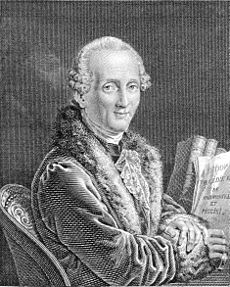Niccolò Piccinni facts for kids
Niccolò Piccinni (born in Bari, Italy, on January 16, 1728; died near Paris, May 7, 1800) was a famous Italian composer. He wrote more than 80 operas. During his life, he worked with some of the best writers of opera stories, like Metastasio.
Today, Piccinni’s music is not played very often. But when he was alive, many of his operas were incredibly popular! People mostly remember him because he was invited to Paris. There, some people wanted him to be a rival to another famous composer, Gluck. This led to many arguments between the people who supported Piccinni and those who supported Gluck.
His Life Story
Piccinni was born in Bari, Italy. His father was a musician but did not want Niccolò to study music. However, a bishop convinced his father to change his mind. So, Niccolò went to a music conservatory in Naples.
He started writing funny operas, called opera buffa. One of his operas, La Cecchina, ossia la buona Figliuola, became a huge hit! It played for two years in Rome and was performed in all the major cities across Europe. It was probably the most popular comic opera of the 18th century.
Piccinni’s music often had a sweet and emotional feeling. This style was very popular in the mid-1700s and was common in early Classical music.
The Paris Rivalry
A few years later, Queen Marie Antoinette invited Piccinni to live in Paris. He had married Vincenza Sibilla in 1756. She was a singer, but he did not let her sing on stage after they got married.
The people who invited Piccinni to Paris were not big fans of Gluck’s music. They wanted Piccinni to be a rival to Gluck. These people enjoyed arguments and tried to make the two composers enemies. There were many arguments between those who supported Piccinni and those who supported Gluck. This whole situation is often called "the war between the Piccinnists and the Gluckists." It was quite silly because the arguments had little to do with the music itself.
Both composers were asked to write an opera based on the same story: Roland. Gluck never finished his version because he wanted to end his career with another opera called Alceste. He did not want to be compared to Piccinni. Then, both composers were asked to write operas about the story of Iphigénie en Tauride. Gluck’s opera was performed first on May 18, 1779. Piccinni's Iphigénie followed on January 23, 1781. The rival groups kept arguing, even after Gluck left Paris in 1780. Some people even tried to find a new rival for Piccinni, inviting Sacchini to Paris. But Piccinni remained popular.
When Gluck died in 1787, Piccinni suggested that a public monument should be built to honor him. However, Gluck’s supporters refused to help with the idea.
Later Years
In 1784, Piccinni became a professor at the Royal School of Music. This school later became part of the famous Conservatoire.
When the French Revolution started in 1789, Piccinni went back to Naples. At first, King Ferdinand IV welcomed him warmly. But when Piccinni’s daughter married a French supporter of the revolution, the people in Naples became angry. They thought he was a revolutionist. Because of this misunderstanding, he was not allowed to leave his house for four years.
For the next nine years, he tried to make a living in Venice, Naples, and Rome. But he returned to Paris in 1798. The public there gave him a warm welcome, but he did not earn much money. He died at Passy, near Paris.
Piccinni wrote over eighty operas. Even though his later works showed some influence from French and German music, his style mostly remained typical of Italian musicians from the 18th century.
See also
 In Spanish: Niccolò Piccinni para niños
In Spanish: Niccolò Piccinni para niños


